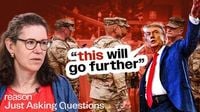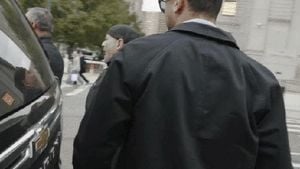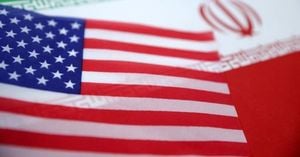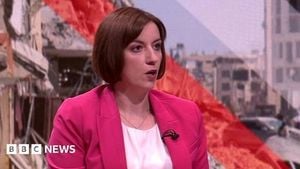On August 20, 2025, the animated juggernaut South Park took direct aim at President Donald Trump’s controversial federal takeover of Washington, D.C.’s police department, launching a searing satirical episode that has reverberated far beyond the world of television comedy. As the nation’s capital found itself the epicenter of a sweeping federal law enforcement operation, the show’s creators, Trey Parker and Matt Stone, didn’t miss a beat—parodying not just Trump’s actions, but the broader political and cultural fallout that has ensued.
The latest episode, which aired on Comedy Central, was anything but subtle. Viewers watched as Towelie, the show’s famously irreverent, anthropomorphic towel, cruised through the streets of D.C., passing by iconic landmarks like the Supreme Court and Capitol. The city was depicted as a militarized zone: armed troops marched in formation, and a tank rumbled past the White House. According to the Associated Press, this was a pointed reference to Trump’s real-life deployment of 800 National Guard members and the federalization of the city’s police force earlier in August—a move the president justified by citing rising crime, homelessness, and immigration, though the data he used was from 2023, before violent crime rates had actually begun to decline.
But South Park didn’t stop at lampooning Trump’s law-and-order push. The episode also skewered world leaders and tech CEOs for their perceived deference to the president, blending its trademark absurdity with biting political commentary. As reported by Spectrum News, the show’s third episode of the season continued a pattern of targeting the Trump administration, having opened its 27th season in July with a satirical conversation between Trump and the Canadian prime minister about tariffs. In a recurring bit, the cartoon version of Trump was shown in bed with Satan—an image as provocative as it is emblematic of the show’s willingness to court controversy.
This latest installment wasn’t the first time the season had drawn the ire of administration officials. In the previous episode, South Park depicted Homeland Security Secretary Kristi Noem shooting puppies, a jab at a story from her memoir in which she recounted killing her family’s dog for behavioral issues. Noem, for her part, fired back during an appearance on The Glenn Beck Program, saying, “It’s so lazy to just constantly make fun of women for how they look. If they wanted to criticize my job, go ahead and do that, but clearly they can’t. They just pick something petty like that.” The Department of Homeland Security even joined the fray, posting a recruitment message for Immigration and Customs Enforcement on X featuring imagery from the episode. The show’s official account responded with characteristic snark: “Wait, so we ARE relevant?”—a pointed rejoinder to a White House spokesperson’s earlier claim, reported by Variety, that the show “hasn’t been relevant in years.”
Despite the administration’s dismissals, South Park is enjoying renewed attention. Comedy Central told the Associated Press that the Noem episode achieved the highest audience share in the show’s history, a testament to its enduring ability to capture—and provoke—the public imagination. Behind the scenes, Parker and Stone have been busy as well, signing a massive $1.5 billion, five-year deal with Paramount for new episodes and streaming rights, according to multiple outlets. The timing was fortuitous: the Federal Communications Commission, under the Trump administration, approved Paramount’s $8 billion merger with Skydance the same month, even as the president was locked in a legal dispute with CBS’s 60 Minutes (also under the Paramount umbrella) over an interview with former Vice President Kamala Harris.
While the animated world of South Park may seem far removed from the real-life drama unfolding in Washington, the lines between satire and reality have blurred in recent weeks. On August 21, President Trump himself announced on the Todd Starnes Radio show that he would join law enforcement on the streets of D.C. that very night, patrolling with the police and National Guard. “I’m going to be going out tonight,” Trump told Starnes. “I’m going to keep it a secret. You’re the only one that knows—you and your lots of listeners. I’m going out tonight, I think, with the police and with the military, of course. And we’re going to do a job.”
Vice President JD Vance, meanwhile, has made no secret of the administration’s broader ambitions. Speaking to WABE radio in Atlanta, Vance revealed the White House “hopes” cities across the country will follow the capital’s lead by handing over local law enforcement to federal control and welcoming the National Guard. “What we’ve done is we have focused on Washington, D.C., because it’s a federal city under our jurisdiction,” Vance said. “But we certainly hope that whether it’s Atlanta or anywhere else, people are going to look around and say, ‘We don’t have to live like this.’”
Attorney General Pam Bondi announced that nearly 400 arrests had been made in Washington since the operation began, including at least 160 undocumented immigrants, according to ABC News. FBI Director Kash Patel publicly praised the administration for “plummeting” homicide numbers—though, as several outlets including Reason.com noted, violent crime in D.C. had already been on a downward trajectory since 2024, a fact that complicates the administration’s narrative of a city in crisis.
The debate over the federal intervention has sharply divided political leaders and commentators. Democrats like Senator Chris Van Hollen of Maryland have accused Trump of exaggerating the city’s crime problem for political gain. On the other hand, Washington Post columnist Megan McArdle, herself a D.C. resident, argued that failures in Democratic governance and a police pullback following the 2020 George Floyd protests have fostered public support for Trump’s actions. She warned that unless local politicians address these challenges, the appetite for further federal intervention—and the erosion of local control—will only grow.
The Reason.com podcast, which aired on August 21, delved into the complexities of balancing civil liberties, rule of law, and public safety in the face of such unprecedented federal action. The hosts wrestled with the dilemma: “We don’t want to demonize police, nor do we want to let them abuse their power. We don’t want criminals to wreck our cities, nor do we want to lock up delinquent teens… and throw away the key. We don’t want lawlessness, nor militarized police operating under permanent emergency powers.”
As the dust settles in the nation’s capital, one thing is clear: the intersection of politics, policing, and pop culture has never been more charged. Whether South Park’s irreverent satire will shape public opinion or simply reflect it remains to be seen, but for now, both the city’s streets and its television screens are battlegrounds in a broader struggle over the future of American governance.





